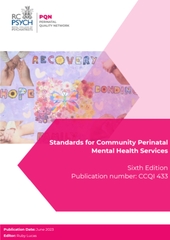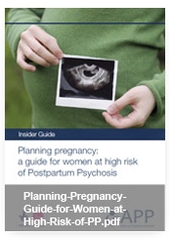If you would like more information about the vital role of parent-infant services, please see:

Royal College of Psychiatrists Pdf, 516.0kb
Published: June 2023
These standards are designed to be applicable to community perinatal services and can be used by professionals to assess the quality of the team. The standards may also be of interest to commissioners, patients, carers, researchers and policy makers.

Action on Postpartum Psychosis Pdf, 907.5kb
Published: March 2018
Women with bipolar disorder, or with experience of PP, told us about the issues they faced when planning for a baby. This guide brings together advice from professionals and families about getting the support you need in pregnancy and birth.